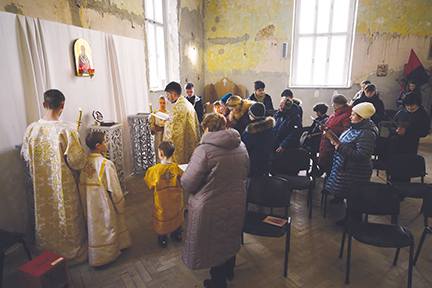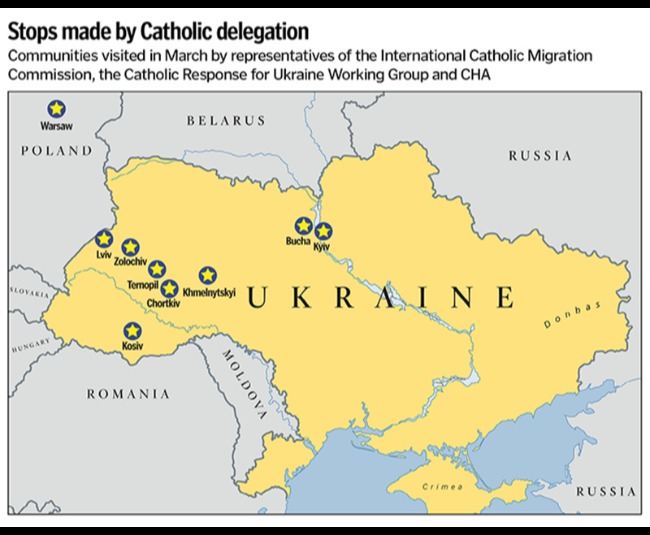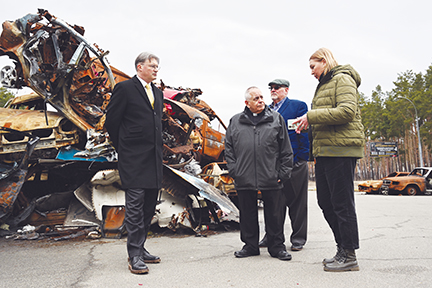By JULIE MINDA
When a trio of leaders from Catholic organizations visited Ukraine in March, they saw how the Catholic Church and related charitable organizations are fortifying efforts by parish and other church ministries to accompany and aid people who have lost family members, homes and peace of mind in the war with Russia.
 Parishioners celebrate Mass in the chapel of the St. Nicholas House of Mercy in Lviv, Ukraine. CHA was represented on a three-man delegation that visited places in Ukraine — including this House of Mercy — where Catholic organizations are aiding people harmed by the war.Credit: © Andrey Gorb/ICMC
Parishioners celebrate Mass in the chapel of the St. Nicholas House of Mercy in Lviv, Ukraine. CHA was represented on a three-man delegation that visited places in Ukraine — including this House of Mercy — where Catholic organizations are aiding people harmed by the war.Credit: © Andrey Gorb/ICMCOver 10 days, Msgr. Robert Vitillo, Bruce Compton and Christian Kostko learned firsthand about some of the church's relief work in Ukraine. They visited parish-run centers where mental health therapy and psychosocial support aim to ease emotional and physical suffering. The delegation called on ministries housing and caring for displaced children.
They spoke with seminarians gaining the skills and knowledge they'll use to minister to parishioners who will no doubt be processing the trauma of war for years, if not lifetimes.
Msgr. Vitillo, who led the delegation, has made several trips to Ukraine in his capacity as secretary general of the International Catholic Migration Commission. Based in Geneva, the commission brings together a worldwide network of Catholic bishop conferences and Catholic-inspired organizations working on migration and refugee issues. Msgr. Vitillo also leads Catholic Response for Ukraine Working Group. Kostko is a management consultant for that group. Compton is CHA's senior director of global health.

The three began their journey March 1 in Warsaw, Poland, where they met with representatives of Catholic Relief Services and the Polish Rescue Organization to learn how those organizations are responding to the urgent needs of the Ukrainian people.
The trio also met with Polish officials. According to the United Nations, 1.58 million Ukrainians are registered for temporary protection in Poland. Msgr. Vitillo said at various periods since February 2022, upwards of 5 million Ukrainians, mostly women and children, have sought refuge there.
Crossing the Polish-Ukrainian border, the delegation traveled to Lviv in Western Ukraine. Representatives of the Sovereign Order of Malta and that Catholic lay group's charitable arm talked to the delegation about the relief the organization has delivered or funded in Ukraine throughout the war, including food, beds, generators, medical equipment and services, psychological health care and social work. Much of the supplies come from Europe and from North America.
The delegation visited a state-run orphanage in Lviv as well as a foster home taking in displaced children who receive volunteer and professional support through St. Nicholas House of Mercy. St. Nicholas and other House of Mercy facilities are diocesan- and parish-affiliated centers that offer social and mental health services.
Recounting aspects of the trip with ministry peers during a special March 30 CHA global health networking call, Compton said that everywhere the delegation traveled, there was evidence of destruction — annihilated buildings, bombed out cars, shrapnel, walls pocked with bullet holes, fresh graves in rapidly expanding cemeteries.
But Compton said he was struck by the nation's resilience: people busily going about their daily tasks mere minutes after civil defense sirens had gone quiet, children at the orphanage who sang and danced just steps away from the entrance to the facility's bomb shelter.
Building up local capacity
During an interview for the CHA podcast "Health Calls," Compton said the Catholic Church's relief efforts in Ukraine are largely focused on directing resources through existing church ministries to build local capacity — an approach CHA endorses.
Msgr. Vitillo emphasized the value of this approach in a video about the series of visits he has made to Ukraine. He said that during crises, the church responds in a way that goes beyond meeting pressing material and physical needs. He said the church often already has a presence in communities hit by disaster and "it will stay during the crisis … and then it will be there afterwards, too. It's accompanying the people."
Msgr. Vitillo's organization, the International Catholic Migration Commission, is providing financial and technical support to Ukrainian parishes to bolster their capacity to deliver spiritual care, mental health care, and child protective services. The commission is funding trauma care and mental health training for seminarians in formation programs associated with both Greek and Roman Catholic Churches in every part of the country.
The delegation spent time at Sheptytsky Hospital, which is preparing to equip patients with prosthetics and provide them with rehabilitation services. Msgr. Vitillo has appealed to Catholic health systems in the U.S. to provide prosthetics and other resources to Ukrainian amputees. The country is rife with minefields.
During his networking call, Compton noted that the work going on in Lviv illustrates the value of providing resources to build up local capacity rather than bringing in outside practitioners to direct and deliver emergency relief services.
Faulty assumptions
The delegation made stops in three other communities in Western Ukraine — Zolochiv, Chortkiv and Ternopil. They toured a center for children and adults with Down syndrome and for survivors of human trafficking and sexual violence. They also visited a House of Mercy and a foster home for displaced children. They met a pastor/farmer in a rural parish who has been selling produce, honey and candles to generate funds for Catholic Church ministries that serve disabled people in the area.
The group spoke with clinicians and seriously wounded soldiers at a hospital in Ternopil. Compton said during the networking call that he had been surprised to see the advanced medical technology in use at the hospital.
 Near Bucha in north central Ukraine, Ukrainian Olga Shatylo shows the delegation cars destroyed in the Ukrainian-Russian war. From left are Christian Kostko, a management consultant for the Catholic Response for Ukraine Working Group; Msgr. Robert Vitillo, secretary general of the International Catholic Migration Commission; Bruce Compton, CHA senior director of global health; and Shatylo.Credit: © Andrey Gorb/ICMC
Near Bucha in north central Ukraine, Ukrainian Olga Shatylo shows the delegation cars destroyed in the Ukrainian-Russian war. From left are Christian Kostko, a management consultant for the Catholic Response for Ukraine Working Group; Msgr. Robert Vitillo, secretary general of the International Catholic Migration Commission; Bruce Compton, CHA senior director of global health; and Shatylo.Credit: © Andrey Gorb/ICMCCompton underscored that while well-meaning health care facilities may think they are helping by donating outdated medical equipment to facilities overseas, it is always best to learn directly from intended recipients what is needed. Money is almost always preferrable to used equipment, according to Compton, especially if replacement parts will prove hard to come by.
The delegation learned about medicine and medical equipment that is unavailable for purchase in Ukraine or in bordering countries. The Catholic Medical Mission Board and Hospital Sisters Mission Outreach are providing some of these supplies, and the Knights of Columbus is paying shipping and handling costs to get them to Ukraine. The container with goods valued at nearly $1 million was to be shipped to Ukraine in late April.
Hot war, living history
Christ the King parish in Khmelnytskyi also is using money from the International Catholic Migration Commission to increase the number of and provide training to mental health professionals, so they can tend to the psychosocial needs of parishioners.
Compton shared with participants in the networking call that it felt surreal to tour a military museum in the basement of the Christ the King church. Some artifacts of the bloody modern conflict over Ukrainian sovereignty date back over a decade. Russia seized Crimea from Ukraine in 2014.
The church gives Ukrainian troops heading to the battlefield prayer books, rosaries and small pins that have religious significance to the troops and to the people in the parish. Parishioners from the Khmelnytskyi church collect basic supplies that they periodically deliver to troops on the frontlines.
The delegation's time in Kyiv coincided with a Russian drone and heavy missile offensive targeting infrastructure in major cities. Air raid sirens sounded their first morning in the city.
When the shelling stopped, the group visited memorials to fallen soldiers. In towns on the outskirts of Kyiv, they met with locals who shared their experiences and losses. One woman tended a flower garden on property that her husband's family had owned for generations. All three houses on the property had been destroyed by bombs and resulting fires. Most of her family members had fled Ukraine, but the woman and her husband remained, living with neighbors and holding out hope for rebuilding.
The delegation visited Bucha and Irpin, cities that had been under siege and occupied by Russian forces before being retaken by Ukrainian troops in March 2022. In that area, the three delegation members viewed the site of a mass grave containing the victims of the earliest attacks on these towns, which were less than 10 kilometers from the capital city of Kyiv.
The woman who brought them there also showed them a small building where she and neighbors had holed up during shellings, tank fighting and rifle fire. The military action occurred over two weeks' time. Compton said the delegation learned that when the civilians were hunkered down, each time a small contingent of the civilians would run from the building to a well to get water, Russian snipers would shoot at them, and this resulted in casualties.
At their last stop, in Kosiv, the delegation observed weekend retreats for veterans and their spouses who are processing the emotional, mental and spiritual fallout of the war. The International Catholic Migration Commission is financially supporting the retreats, which are run by the Knights of Columbus.
Light in the darkness
Compton called his time in Ukraine a "life-changing experience. It was devastating and yet encouraging. It was hopeful in so many ways, but also awful, to see the reality of what has happened in Ukraine and is continuing to happen."
But, he said, "We saw the church in action. We saw the beauty of the people, the amazing humanity" of their response to the countless needs all around them.
Information on how Catholic organizations are responding to Ukrainian people's needs, a link to Compton's "Health Calls" podcast, information on recommended ways to support the people of Ukraine and other details are available at chausa.org/global-health/Ukraine.
CR4U working group coordinates aid efforts benefitting Ukrainians
A group of Catholic and Catholic-affiliated aid organizations coordinate aid for Ukrainians in country and war refugees in Poland, Hungary, Slovakia, Moldova and Romania through Catholic Response for Ukraine.
The organizations represented in Catholic Response for Ukraine are:
- International Catholic Migration Commission
- Caritas Internationalis
- Caritas Europe
- Jesuit Refugee Services Europe
- The Commission of the Bishops' Conferences of the European Union
- The Council of Bishops' Conferences of Europe
- Sovereign Order of Malta/Malteser International
- Knights of Columbus
- Members collaborate closely with the following offices of the Roman Curia:
- Dicastery for Promoting Integral Human Development
- Migrants & Refugees Section